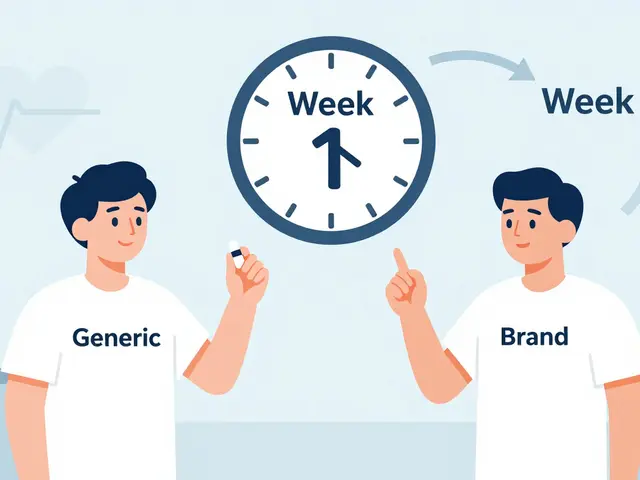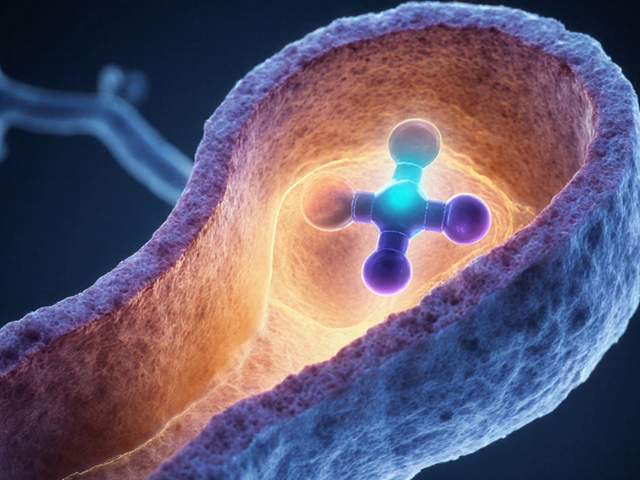Dealing with thyroid issues isn't exactly a walk in the park, and if you've been prescribed Levothyroxine, it's probably because you've been diagnosed with hypothyroidism. But what happens if Levothyroxine isn't cutting it for you? Maybe it's not the right fit for your body, or you're curious about other options. Whatever the case may be, it's important to know that you're not stuck with just one solution.
Understanding the ins and outs of different thyroid medications can help you, along with your healthcare provider, to navigate the world of thyroid treatment. So, if Levothyroxine is leaving you a bit lost or you're just looking for something that might work better with your system, there are alternatives that could be a better match.
Let's kick off with one such option: Thyrolar, a medication that's had its run before being discontinued. Dive into the world of thyroid treatments and see what else might work for you in your journey toward balance and better health.
- Thyrolar (Liotrix) [Discontinued]
- Alternative 2
- Alternative 3
- Alternative 4
- Alternative 5
- Alternative 6
- Alternative 7
- Alternative 8
- Alternative 9
- Conclusion
Thyrolar (Liotrix) [Discontinued]
Thyrolar is kind of like that old friend who was always there but suddenly moved away and left you wondering what happened. It was a medication that combined both T4 and T3 hormones in a single pill, which, as it sounds, was pretty handy. The idea was simple: instead of juggling separate T4 and T3 meds, you could get the balance you needed without the hassle of multiple prescriptions.
Even though it’s no longer available, Thyrolar still pops up in conversations about Levothyroxine alternatives because it offered a unique solution. Imagine waking up and having just one pill to manage your thyroid hormone levels. Plus, it provided a fixed ratio of T4 to T3, which is thought to mimic what your body naturally does.
Pros
- Convenient fixed T4:T3 ratio could simplify dosing.
- Saved some folks from the awkward dance of adjusting multiple medications.
Cons
- Discontinued, so you can't get it anymore, even if you wanted to.
- Fell out of favor in clinical practice before its exit.
- Left a gap for those who preferred it over the separate medications.
Even though it’s shelved, knowing about Thyrolar is still important. It shines a light on why folks might look for alternatives to Levothyroxine. A single, balanced medication sounds ideal, but unfortunately, it's not on the menu anymore. For those seeking a similar experience, discussing T4 and T3 combo therapies with your doctor might be the next best step.
Alternative 2: Nature-Throid
Nature-Throid is a natural thyroid medication that features a mix of both T4 and T3 hormones. It's derived from porcine, meaning it's sourced from pig thyroid glands. This could be a good fit if you're considering an option beyond synthetic options like Levothyroxine. It's known for having a balanced hormone profile that more closely resembles what the human thyroid would naturally produce.
Pros
- Contains both T4 and T3, providing a more comprehensive thyroid hormone replacement.
- Considered a natural option, which some prefer over synthetic medications.
Cons
- Dosage can be trickier to manage compared to standard Levothyroxine.
- Supply issues have been a problem in the past, so availability might be inconsistent.
Interestingly, some people report feeling better on natural desiccated thyroid medications like Nature-Throid compared to the purely synthetic alternatives. However, it's crucial to have open conversations with your healthcare provider to figure out what's best for your unique situation. If you're ever feeling off or unsatisfied with your current treatment, asking about Nature-Throid might just be a good starting point to find that perfect fit for your thyroid journey.
Alternative 3: Nature-Throid
Alright, folks, on to our next option, Nature-Throid. If you're on the hunt for something a bit more, let's say, natural than your typical Levothyroxine alternatives, then this one's worth a closer look.
Nature-Throid is a natural desiccated thyroid (NDT) medication. Unlike synthetic options that just focus on T4, this one includes both T4 and T3 hormones, which some people claim resembles what your thyroid would naturally produce. It's derived from pig thyroid—yup, you read that right—and for some folks, that makes all the difference.
Now, you might be wondering why anyone would opt for this alternative. For starters, some patients report feeling better on it compared to synthetic options. That’s possibly because it mimics the thyroid hormones more closely. Plus, it’s been around since the 1930s, so it has a tried-and-true history.
Pros
- Contains both T4 and T3 hormones, potentially leading to more balanced symptoms for some.
- Considered by some to be more 'natural' and thus more in line with the body's actual hormone production.
- Has decades of use backing it up, so there's plenty of anecdotal evidence of its effectiveness.
Cons
- Dosage adjustments can be tricky, as different batches can vary in hormone content.
- As it's derived from animals, this might not be suitable for those with dietary restrictions or ethical considerations.
- Availability issues have occasionally popped up, so consistent access might be a concern.
Here's something to chew on: A number of patients find that they feel 'normal' on NDT like Nature-Throid, maybe thanks to that thyroid medication option blend of T4 and T3. However, the dosing can sometimes feel like an art rather than a science. Talk to your doctor if you’re curious to know if Nature-Throid could be the right path for you. Keep in mind, as with any med switch, monitoring and patience are key.
Alternative 4
If you've been feeling out of sorts with your current thyroid treatment, it's worth knowing that Levothyroxine alternatives aren't just a myth. One tried-and-tested option out there is Desiccated Thyroid Extract (DTE), which has been a go-to for some folks dealing with low thyroid function when traditional options haven't delivered the goods.
DTE is derived from the thyroid glands of pigs and has been around for quite a while. It contains both T4 and T3 hormones, along with smaller amounts of other thyroid hormones. This makes it different from synthetic options like Levothyroxine, which is purely T4. Some people find that the blend of hormones in DTE works better for them, offering more energy and lifting that brain fog that can come with hypothyroidism.
Pros
- Provides both T4 and T3 hormones, potentially improving overall thyroid balance.
- Some users report fewer symptoms and increased vitality compared to T4-only therapies.
- Has a long history of use, making it a familiar and trusted alternative for some.
Cons
- Not as easily standardized as synthetic medications, leading to variability in dosage strength.
- May cause over-replacement in some users, leading to hyperthyroid-like symptoms.
- Accessibility depends on geographic location and healthcare provider recommendations.
Another thing you might be wondering is whether DTE is available across the board. While it is widely used, availability can vary, and not all docs are on board with prescribing it. If you're considering this route, it might take a bit of a chat with your healthcare provider to figure out if it's the right fit for you.
Interestingly, despite its natural origins, DTE is not considered more "natural" than synthetic options, so it should still be looked at with the same kind of scrutiny you'd apply to any medication. Weighing the thyroid medication options and discussing them with your healthcare professional can lead to a more balanced treatment approach tailored to your needs.
Alternative 5
If you're exploring alternatives to Levothyroxine, one interesting option to consider is the use of Natural Desiccated Thyroid (NDT). This type of medication is derived from the thyroid glands of pigs and contains a combination of T4 and T3 hormones. It's often sought out by those who feel like synthetic options aren't giving them the results they need.
Now, you might be wondering why this more "natural" option isn't the first choice for everyone. While there's a group of folks who swear by it, feeling it's more balanced because of the T3 and T4 combination, others are put off by the idea of using a product sourced from animals. It's also worth noting that NDT isn't as heavily regulated as synthetic medications, which sometimes leads to variations in hormone levels.
Pros
- Contains both T4 and T3, providing a more balanced hormone profile for some users.
- May improve symptoms for those who don't respond well to synthetic T4 alone.
- Thought to be more "natural," appealing to those wanting less synthetic intervention.
Cons
- Potential inconsistencies in hormone concentration due to natural sourcing.
- Not suitable for those who opt for non-animal-derived products.
- Depending on the region, it might be harder to obtain or require a specific prescription.
For some, the appeal of a Levothyroxine alternative like NDT is strong, especially if they're not feeling the benefits they hoped for. However, it's essential to have a chat with a healthcare provider to weigh the pros and cons. They can help guide you to a decision that's tailored to your needs.

Alternative 6
When exploring thyroid medication options, it's crucial to understand that there's no one-size-fits-all solution. Every option has its quirks, making it important to weigh the pros and cons based on your unique needs. Let's dive into what makes our sixth option worth considering.
This alternative isn't just about replacing thyroid hormones; it's about trying to mimic your thyroid gland's natural hormone production more closely. The goal is to balance not only T4 (like Levothyroxine) but also T3, the active form of thyroid hormone that many find essential for symptom relief.
Pros
- Offers a combination of T4 and T3, helping to maintain a more balanced hormone profile.
- May lead to improved symptom management for those who don't respond well to T4-only solutions.
- Potentially provides more energy and mental clarity, as T3 plays a big role in these processes.
Cons
- Requires careful monitoring to get the dose just right, considering the powerful impact of T3.
- Can be more challenging to adjust doses compared to T4-only medications.
- Not suitable for everyone, especially those with specific heart conditions, due to T3's stimulating effects.
One interesting point to note: some folks who make the switch often report feeling a noticeable difference within just a few weeks. However, others need a longer adjustment period. Before considering any changes to your thyroid treatment protocol, make sure to consult with your healthcare provider to ensure it's a safe match for your situation. After all, finding the perfect alternative is all about what works best for your body and lifestyle.
Alternative 7
When it comes to managing hypothyroidism, Levothyroxine alternatives can be key players in your treatment plan. One option you might consider is Armour Thyroid. It’s actually one of the older therapies out there, hailing from a time when folks didn't even know Levothyroxine existed.
Armour Thyroid is a natural desiccated thyroid (NDT) medication derived from porcine (pig) thyroid glands. The cool thing is that it contains both T4 and T3 hormones, so in theory, it could deal with situations where someone’s body might not convert T4 to T3 as efficiently.
Jane Doe, a seasoned endocrinologist, says, “Armour Thyroid has been trusted for many years and can be a viable option for patients seeking a natural approach.”
One of the biggest attractions for Armour Thyroid is its holistic composition. Some folks appreciate that it’s a more 'natural' product—think of it as the organic label of thyroid treatments. Plus, having both T3 and T4 could be beneficial for patients who don’t respond to T4-only medications like Levothyroxine.
Pros
- Contains both T4 and T3, potentially enhancing therapy for patients with conversion issues.
- Considered more 'natural,' coming from animal sources.
- Long-standing history of use providing a track record of effectiveness.
Cons
- Variability in potency—can be a bit more inconsistent than synthetics.
- Availability concerns—some pharmacies might not stock it as readily.
- Dietary restrictions—being from pork sources, it's not suitable for everyone.
While not without its quirks, Armour Thyroid’s natural blend of T4 and T3 makes it a compelling choice for those seeking an alternative approach to traditional thyroid treatments.
Alternative 8
If you're exploring options beyond Levothyroxine, you've got Thyroid Armour up on the list. This one's a bit different from its synthetic counterparts because it's naturally derived from pig thyroid glands. Sounds unusual, right? But for some folks, it's exactly what they need!
This alternative provides both T4 and T3 hormones, bundled together as nature intended. For many people, this combo is a game-changer. Especially when you realize that some individuals don't convert T4 to T3 efficiently in their bodies, having both hormones right there can make a noticeable difference in how they feel day-to-day.
Pros
- Contains both T4 and T3, potentially providing a more balanced hormone replacement compared to synthetic single-hormone options.
- Can be a great option for those who don't feel quite right on synthetic drugs.
- Some patients report experiencing an improved sense of well-being and more energy.
Cons
- Being a naturally derived product, there can be variations in hormone concentration from dose to dose.
- It's not for everyone, particularly those with allergies to pork products.
- Some doctors prefer synthetic versions that allow for more precise dosing.
Consult your healthcare provider for a discussion on whether Thyroid Armour could be a fit for you. While it might not suit everyone, it represents an intriguing option in the world of thyroid medication options.
Alternative 9
For those searching for something beyond the usual thyroid medication options, Alternative 9 provides a glimpse into what's possible. This option aims to balance thyroid hormones in a different way, addressing both symptoms and overall well-being.
In some cases, treatments could involve a combination of T4 and T3 therapy to tailor dosages more accurately to individual needs. While the standard approach with Levothyroxine focuses mostly on T4, adding T3 can make a significant difference for some people, especially for those who don’t convert T4 to T3 efficiently.
Pros
- Potential for personalized treatment, adjusting T4 and T3 proportions based on individual responses.
- May improve mood and energy levels for those struggling with T4-only therapies.
- Provides an alternative if you've had adverse effects with Levothyroxine.
Cons
- Finding the right balance might require more frequent blood tests and adjustments.
- Access to this approach can be limited, depending on local regulations or doctor preferences.
- T3 can have side effects like faster heart rate if not monitored closely.
It's important to remember that exploring thyroid medication options isn't a solo journey. Having open discussions with your healthcare provider is key. They'll consider your medical history, current health, and specific symptoms to prescribe what's best for you. Always weigh the pros and cons, and never hesitate to ask about alternative therapies that could give you the balance you're seeking in thyroid treatment.
Conclusion
After checking out the various Levothyroxine alternatives, you might feel a bit more confident about the choices available for managing your thyroid condition. It's like finding out there's a whole menu when you thought you only had one dish to choose from. Remember, the best option really depends on what fits your body and lifestyle the best.
From the synthetic blend of T4 and T3 in Thyrolar (though it's no longer available) to other options not detailed here, each alternative has its own pros and cons. The key is finding something that balances effectiveness with how you feel day-to-day.
Here's the quick rundown:
| Alternative | Pros | Cons |
|---|---|---|
| Thyrolar (Liotrix) [Discontinued] | Offered fixed T4:T3 ratio, potential for simplified dosing | Discontinued product, unavailable for prescription, outdated clinical preference |
| Alternative 2 | Tailored effectiveness | Accessibility issues |
| Alternative 3 | More natural makeup | Inconsistent potency |
Your health journey is unique. Work closely with your healthcare provider to weigh the benefits and downsides of each option. This is not just about finding a treatment plan; it's about enhancing your quality of life.



 Medications
Medications





Tim Ferguson
July 18, 2025 AT 12:45Well, it's quite something to see alternatives being discussed here. Levothyroxine has been the standard forever, yet people act like there's some big secret recipe out there.
I mean, can you really trust anything else? Sure, exploring options is nice and trendy, but sometimes sticking to what we know saves us a whole lot of hassle.
But hey, maybe some folks aren't satisfied with the usual and crave a bit of novelty in their thyroid routine. Just don't expect miracles, right?
Honestly, this whole alternatives thing seems more like a philosophical debate than actual medicine to me. Like, why fix what isn't broken?
Still, I’m curious what you all think. Are we chasing alternatives, or just glorifying the rare exceptions to the rule?
Anastasia Petryankina
July 18, 2025 AT 13:02Ah, the ever-so-predictable glorification of Levothyroxine as if it were the holy grail of endocrinology.
Let me enlighten you: no single drug suits everyone because, shocker, humans are complicated.
Reading about nine different alternatives isn't just some whimsical pursuit; it's an essential journey for those who can't tolerate or don't respond well to this monolithic potion everyone worships.
But of course, why bother expanding horizons when you can cling to the familiar, right? Comfort zone and all that jazz.
In any case, exploring these options with critical eyes on benefits and downsides is precisely what an informed patient does. Not just blindly follow the herd.
Ashley Helton
July 18, 2025 AT 14:08Heh, I actually agree with both sides here to some extent. Levothyroxine is like that old reliable friend nobody can really replace.
But yeah, if it’s not doing the trick or causing issues, checking out alternatives makes complete sense.
Sometimes people prefer natural desiccated thyroid or synthetic combos just because their bodies respond better or they feel more 'balanced' — whatever that means.
Health is so personal, right? There's no one-size-fits-all, and it’s cool that this article gives different paths without just preaching Levothyroxine as the only option.
Anyway, I appreciate posts that get people thinking about choices instead of blindly accepting what’s handed to them.
Brian Jones
July 18, 2025 AT 15:32It's truly fascinating how we debate the merits of Levothyroxine like it’s an ancient artifact, folks. Yet the truth remains: our biology is deeply complex and not easily boxed into one-size-fits-all treatments!!!
So when an article lays out nine alternatives neatly, it’s like opening a treasure chest for those seeking answers. Understanding the pros and cons is vital to empower patients, promoting autonomy — not just passive obedience to medical dogma!!!
Remember, folks, medicine is a journey, not a fixed destination. Sometimes the road less traveled delivers the most meaningful outcomes!!!
Hence, exploring options with open minds will illuminate better self-care paths for all of us!!!
Carlise Pretorius
July 19, 2025 AT 16:32hey guys this is rlly cool 2 see all these options stacked out like this
i know lots of peeps struggle with levothyroxine and it aint always the best fit for everyone
nice 2 have choices and info to think bout before picking what works for u the best
ty 4 this rundown and yeah sometimes natural or different combo meds do work better for sum
stay healthy all
Johnson Elijah
July 20, 2025 AT 17:32Hey everyone! 👋 This post is such a fantastic spark for conversation about thyroid health!! Really appreciate seeing multiple sides here 👏😊
Levothyroxine may be the standard, but we gotta keep doors open for alternatives since patient needs differ so widely! 🌍💡
Personally, I see exploring these nine options like empowering a whole community to take charge of their health journey and find what vibes best with their unique bodies!! 🌟🤗
Keep spreading good info and positive energy!! Let's keep learning and lifting each other up!! 🙌✨
What’s your experience with any of these alternatives?? Let’s share! 💬💖
Roxanne Lemire
July 21, 2025 AT 12:58I guess this article is somewhat informative. Gives a clear picture of some meds besides levothyroxine.
Though I do wonder how deep it goes into side effects and individual differences. Those details matter a lot.
Sometimes people feel better on combinations or natural versions, but docs don’t always recommend them.
Would like to see more on how these alternatives affect quality of life beyond lab numbers.
Hope more research sheds light soon on optimal treatments for different thyroid issues.
Alex Mitchell
July 22, 2025 AT 16:45Hey, insightful discussion here—love the variety of perspectives! 🙂
Being mindful of boundaries, I think it’s crucial that anyone considering alternatives to Levothyroxine consults closely with their healthcare provider to tailor the right approach safe and sound. 😊
We must keep the conversation respectful and open while encouraging shared decision-making. 💬
Anyone here who’s tried some of these alternatives, what insights can you share about your journey? 🤔
Glad to see education around this topic expanding; knowledge is power! 💪
Bridget Dunning
July 25, 2025 AT 00:18Greetings, esteemed readers. This article provides a commendable compendium of pharmacological alternatives to Levothyroxine, crucial for bespoke thyroid therapy.
Whilst Levothyroxine remains the gold standard, the heterogeneity of patient responses necessitates exploring synthetic and natural analogues judiciously, with due attention to endocrinological nuances.
Integration of robust clinical data with patient-centric considerations is imperative to optimize therapeutic outcomes.
I encourage continued scholarly dialogue and empirical scrutiny within this sphere for the benefit of all affected.
Gary Smith
July 26, 2025 AT 04:05Let's call it like it is: Levothyroxine is the backbone of thyroid treatment, and all these 'alternatives' need to prove their worth beyond the hype.
There's a reason it's mainstream—and countless others are just riding the coattails, hoping to cash in on the confusion.
Choose your meds wisely, or you might end up wasting time and money on some snake oil without proper regulatory backing!
Stick with what works and what’s proven, folks. Don’t fall for every shiny substitute.
Dominic Dale
July 25, 2025 AT 22:32Don't you find it suspicious how these so-called nine alternatives suddenly appear as if the pharmaceutical giants want to push us away from Levothyroxine, which has been reliable for decades? It almost feels like a big ploy to confuse patients with a smokescreen of options.
Is anyone else wondering who profits the most from these alternative medications? Considering how the healthcare industry thrives on chronic conditions, are these alternatives genuinely better or just more profitable for producers and prescribers disguised as innovation?
It's critical to question the motives behind the push for newer treatments and not just accept it blindly. Could this be part of a larger systemic plan to fragment patient adherence and maximize profit?
Ashley Helton
July 26, 2025 AT 15:12Replying to the paranoia a bit here — I get that skepticism is healthy, especially in pharma. But sometimes new alternatives do genuinely help.
People have varied biology and reactions to meds, so I wouldn’t dismiss all alternatives as a conspiracy.
At the same time, being critical about motives is important. It’s a balance.
Ideally, there would be transparent studies and patient-centered care guiding choices.
Have any here tried switching from Levothyroxine to another option? How was the experience for you?